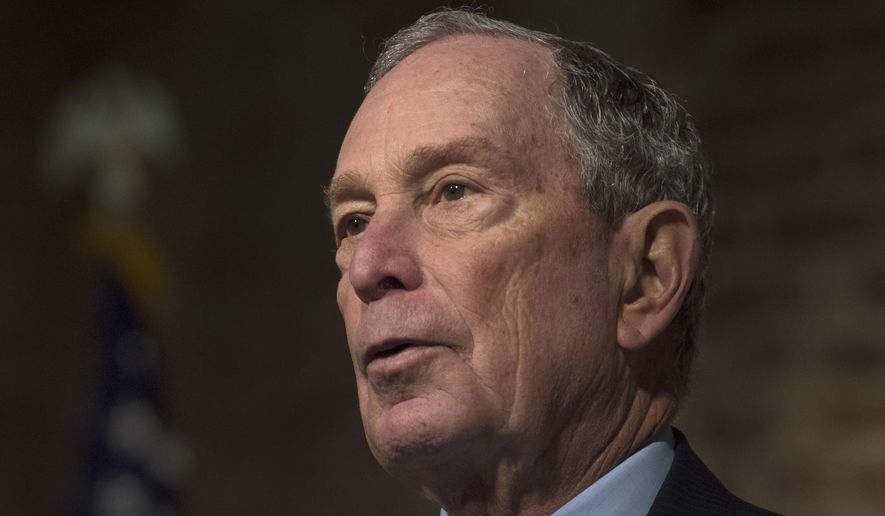Michael R. Bloomberg’s promise not to take money from big donors is right out of Donald Trump’s 2016 playbook, a move that propelled the future president to favorable reviews from Republican primary voters who gravitated to a billionaire self-funding his campaign, unbeholden to special interest groups.
But using the same game plan likely won’t score Mr. Bloomberg, another New York billionaire, any brownie points from Democratic voters who are skittish of the wealthy and see other, more relatable candidates already vowing to keep special interest donors at arm’s length.
And the image of another billionaire running for president may not be what the Democratic Party wants to put up against Mr. Trump.
“The advantage that Trump had over his opponents, that advantage is much less for Bloomberg. It might be kind of neutral because yes, you are going to pay this out of your pocket — but look at how deep your pockets are,” said Richard Pacelle Jr., a political science professor at the University of Tennessee, Knoxville.
“Politics is such an exclusive game,” he added.
Sen. Elizabeth Warren of Massachusetts and Sen. Bernard Sanders of Vermont, two of the party’s far-left presidential hopefuls, have said they won’t hold big-dollar fundraisers.
And they bristle at Mr. Bloomberg’s self-financed run.
“I don’t believe that elections ought to be for sale,” said Ms. Warren, taking a shot at Mr. Bloomberg in an interview on his own Bloomberg Television. “And I don’t think as a Democratic Party that we should say that the only way you’re going to get elected, the only way you’re going to be our nominee, is either if you are a billionaire or if you’re sucking up to billionaires.”
Since launching his campaign two weeks ago, Mr. Bloomberg has garnered about 4% in the national polls, putting him in about fifth place and ahead of a slew of rivals who have spent months on the campaign trail.
Still, Mr. Bloomberg is taking an unconventional route and ignoring some of the first nominating contests. He plans to jump into the 14 states that vote on March 3, the Super Tuesday primaries that could propel him toward the nomination.
It’s a gamble to skip the early contests in Iowa, New Hampshire and South Carolina. Former New York Mayor Rudolph W. Giuliani attempted a similar strategy when seeking the 2008 Republican presidential nomination. He skipped the early contests and set his sights on delegate-rich Florida. But by the time the race got to the Sunshine State, Mr. Giuliani was out of the conversation.
Dick Anderson, a political science professor at the University of California, Los Angeles, said Democratic voters are skeptical of billionaires altogether.
“Michael Bloomberg’s billions are a serious hill for him to climb, and I hope he can’t climb it. An election pitting one New Yorker who reportedly is a billionaire against another New Yorker who reportedly lies when he calls himself a billionaire is about as uninspiring as anyone can imagine,” he said.
Mr. Bloomberg may face an immediate hurdle Dec. 19, when he won’t be on the next Democratic primary debate stage. The Democratic National Committee requires a polling requirement as well as a numerical threshold for small-dollar donations.
But the billionaire isn’t taking donations of any amount — not even $1.
“He has never taken a political contribution in his life. He is not about to start,” Howard Wolfson, Mr. Bloomberg’s chief adviser, told The Associated Press. “He cannot be bought.”
The Bloomberg campaign didn’t respond to a request for comment from The Washington Times.
• Alex Swoyer can be reached at aswoyer@washingtontimes.com.




Please read our comment policy before commenting.